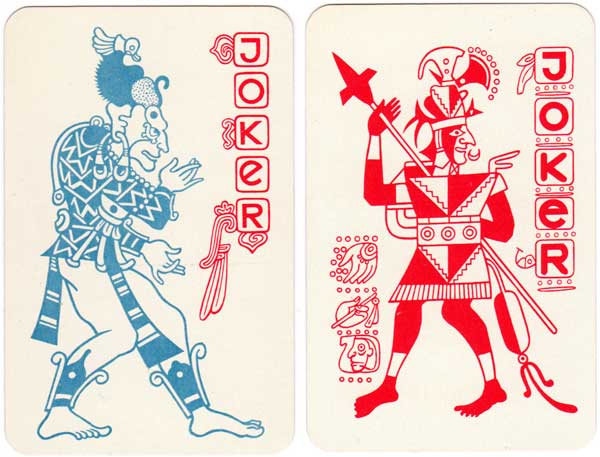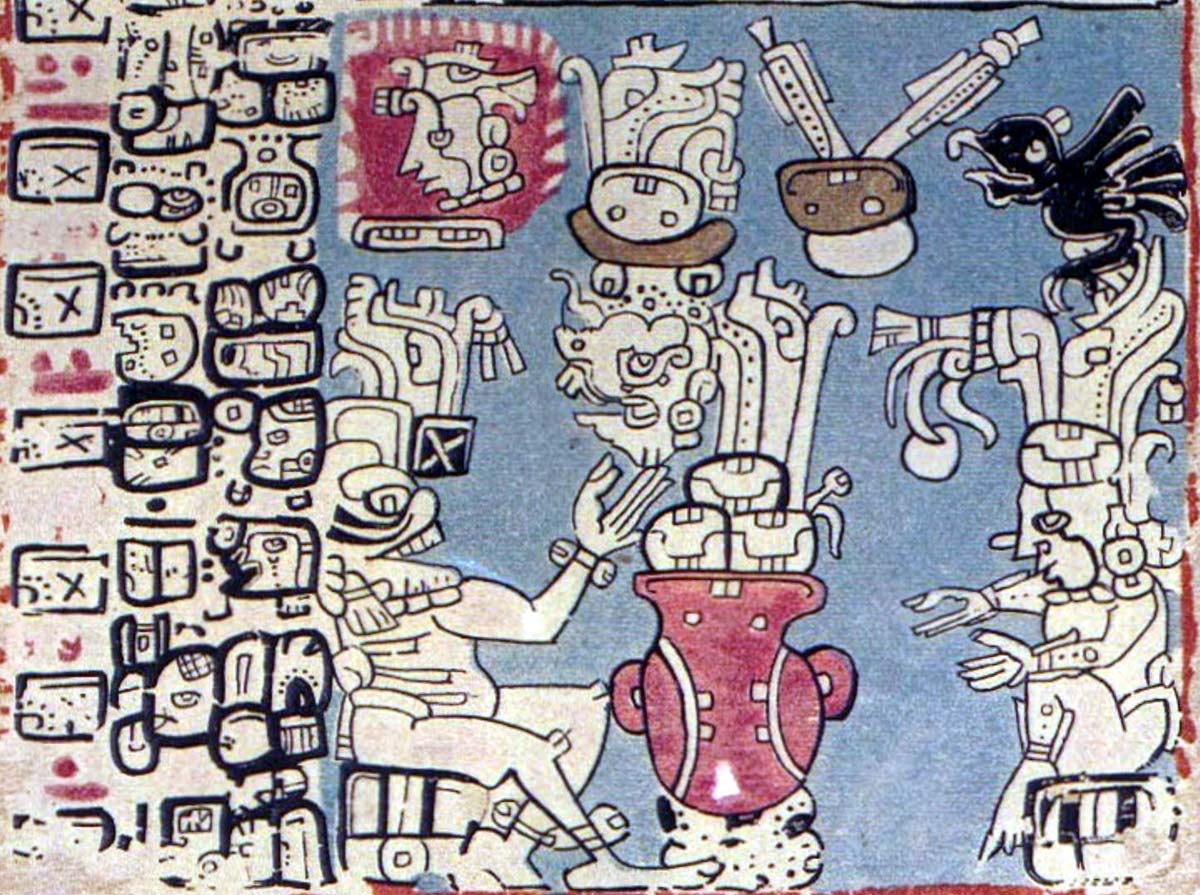Maya
“Maya” playing cards designed by Russian artist V. M. Sveshnikov and first published by The Colour Printing Plant, St Petersburg, in 1975.

Russian “Maya” playing cards
“Maya” playing cards were designed by Russian artist V. M. Sveshnikov and first published by The Colour Printing Plant, St Petersburg, in 1975. The Russian connection to Mayan art stems from when Russian linguist Yuri Knorosov helped crack the code of the Maya glyphs. The intricate designs are inspired by ancient Mayan iconography found in original Mayan artworks from Mexico. The artist's attention to detail also includes the Tzolkin Calendar glyphs on each side of the cards.
The Maya civilization (AD 300-900) was one of the most sophisticated in pre-Columbian America and extended from Mexico across Guatemala, Belize and the western parts of Honduras and El Salvador. Mayan body art, including piercings and sacrificial blood letting, makes today's tattoos and studs seem harmless!

Above: Russian “Maya” playing cards, 52 cards + 2 Jokers. The designs were re-printed in 2012 as "Mayan Cards" with larger European indices and border frames by a Chinese manufacturer.

Above: detail from an astronomical passage in the Códice Trocortesiano, XVI century. MUSEO DE AMÉRICA more →

By Rex Pitts (1940-2021)
Member since January 30, 2009
Rex's main interest was in card games, because, he said, they were cheap and easy to get hold of in his early days of collecting. He is well known for his extensive knowledge of Pepys games and his book is on the bookshelves of many.
His other interest was non-standard playing cards. He also had collections of sheet music, music CDs, models of London buses, London Transport timetables and maps and other objects that intrigued him.
Rex had a chequered career at school. He was expelled twice, on one occasion for smoking! Despite this he trained as a radio engineer and worked for the BBC in the World Service.
Later he moved into sales and worked for a firm that made all kinds of packaging, a job he enjoyed until his retirement. He became an expert on boxes and would always investigate those that held his cards. He could always recognize a box made for Pepys, which were the same as those of Alf Cooke’s Universal Playing Card Company, who printed the card games. This interest changed into an ability to make and mend boxes, which he did with great dexterity. He loved this kind of handicraft work.
His dexterity of hand and eye soon led to his making card games of his own design. He spent hours and hours carefully cutting them out and colouring them by hand.
Related Articles

International pattern from Russia
Colourful international pattern cards from Russia sold in Latvia.

Visite Mexico
Promoting Mexican tourism with 54 different photographs in full colour.

Kazakh Tales
Bold designs by K.K. Karpun and S. Nukenov inspired by Kazakh folk tales.

Egyptium
“Egyptium” is a hand-illustrated deck of fantasy playing cards with artwork by Russian artist Oleg S...

Mexican ethnic playing cards
Mexican ethnic groups depicted on playing cards by Fábrica de Naipes Cuauhtemoc.

Russian Circus deck
The Russian Circus deck published by the Imperial Playing Card Factory, St Petersburg.

Colonial Art
A collection of 53 pieces of art showcasing detailed scenes from early American colonial life.

Wedding of Krechinsky • Свадьба Кречинского
A pack of cards depicting characters from the famous play "The Wedding of Krechinsky" by Sukhovo-Kob...

Russian folk art playing cards
Russian folk art playing cards produced by Natalia Silva, USA, 2017.

Branle playing cards
‘Branle’ playing cards inspired by a 12th-century dance, produced by Noir Arts, USA, 2015.

Mardi Gras playing cards
Mardi Gras playing cards illustrated by Dave Edgerly, USA, 2015

Aztec Codex playing cards
Aztec Codex playing cards illustrated by Emmanuel Valtierra, USA, ©2015.

Malam playing cards
Malam playing cards created by Michael Muldoon, USA, 2015.

Theatre of Pain / Teatr Boli
Theatre of Pain / Teatr boli playing cards depicting politicians and leaders in the Caucasus territo...

CCCP playing cards
Soviet and other Communist celebrities depicted on every card, designed by Vladislav Pankevitch.

Pacific Northwest native Indian masks
Pacific Northwest native Indian masks with artwork by Margaret Parrott, USA, 1992.
Most Popular
Our top articles from the past 28 days

